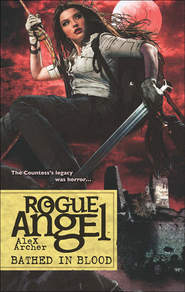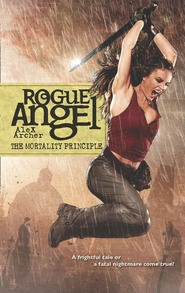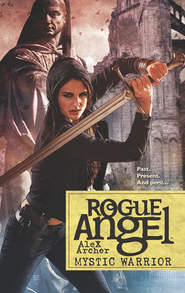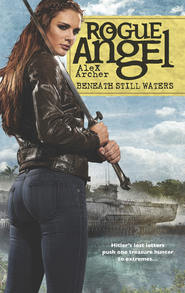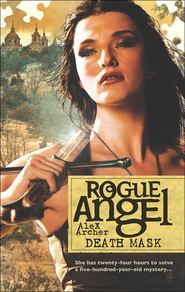По всем вопросам обращайтесь на: info@litportal.ru
(©) 2003-2024.
✖
The Matador's Crown
Автор
Год написания книги
2019
Настройки чтения
Размер шрифта
Высота строк
Поля
Hours earlier, the sun had set in fiery amber ripples on the horizon over the sea. A sharp slice of moonlight glimmered on the waters close to shore. The streets were busy at all hours in Cádiz. The city offered so much to experience in food, music and festivity. And with the bullfights on the mainland in Jerez, Cádiz celebrated with all-night dancing in the streets.
Diego turned a corner into an empty street. Though he’d been a Cádiz resident all his life, the sudden street-to-street changes from festive to silent startled him. He was tired, but the coffee he’d slammed down before leaving the club after tonight’s performance had given him a jolt.
Exiting the momentary solace, he crossed a main street peopled with tourists in jeans, sandals and baseball caps, and entered the Hotel Blanca’s whitewashed stucco facade. Diego smiled at the squat matron behind the front desk who wore black edged with touches of white lace. She was someone’s grandma, surely, and her jet eyes brightened at the sight of him. Yet as he approached, she blew him a kiss that seemed more flirtatious than motherly.
He was always startled to notice a woman’s reaction to his appearance. His mother had called him ma bonita, “my pretty,” but his three brothers had pounded him regularly because of his looks...and possibly because of their mother’s affection for him. And because he had no inclinations toward the bullfight. In a family of toreros dating back three generations, Diego had opted to study music.
His hotel room was on the second floor, overlooking the Atlantic Ocean, several blocks from the avenue Compo del Sur that fronted the beach. Setting the crate on the small, wobbly table near the bed and untying the cotton bag, he let it slide down to his feet and land on the floor. Sitting on the narrow bed, he pulled the guitar around from his back. Quickly, he loosened the E, A and D strings, and drew them out from the wooden tuning pegs so they sprang like whiskers from the bridge. He slipped his hand inside the guitar’s sound hole.
The small statue had fallen out of the cloth bag and felt cold against his palm as he carefully eased it, and the duct tape he’d used to secure it, from inside the guitar. He shouldn’t have taken it out until morning, but he couldn’t play with it inside the instrument, so he set the shiny piece aside next to the wooden crate. Maybe it wasn’t bronze. Maybe it was gold. He was no expert on metals.
He considered what he could buy if he kept the statue for himself. A lot. But if he didn’t deliver it tomorrow morning, he knew he wouldn’t see tomorrow evening.
Now all he had to do was wait for the first meeting—at midnight. An appropriately menacing time to meet a stranger.
Diego passed the hours strumming his guitar.
* * *
AS MIDNIGHT TOLLED, the door to Diego’s hotel room creaked open. Diego abruptly stood as a tall stranger in a long black leather coat stepped in. He wore sunglasses and a dark fedora, the crown of it circled with a red ribbon. The brim was tipped low over his eyes. Cordoba leather shoes caught Diego’s eye. Very expensive. His father had once owned a pair.
He flexed his fingers. He couldn’t recall leaving the door open, but he hadn’t locked it.
“You Diego Montera?” the stranger asked in a low tone.
A dreadful chill froze Diego at the end of the bed, his guitar held ready as if it was a weapon.
“Yes. Are you the liaison for—”
“Yes, the liaison. You have it?”
“Yes. Ah! I need to check a message first.” He eyed the corner of the battered cell phone on the floor, which lay half out of the cotton bag. “Verify the transaction before we do this.”
The other man tipped his sunglasses down and looked over the rim at Diego. “You’ve not done this before, have you, Señor Montera?”
Diego rubbed his sweating palms down the sides of his jeans. He didn’t like that his employer had given his full name to the client. “What makes you think that?”
The thin man smirked as he approached the crate. “Do what you must. All my accounts are in order. Is it in here?”
“Yes.” Diego opened up the cell phone and turned it on. The thing was four years old, taped across the cover and slower than an adagio. He waited for the screen to boot up.
The liaison didn’t seem to notice him. He paused to look at the statue of the bull in bronze...or gold... before pushing aside the top of the crate.
“This was nailed down originally. With more rivets?”
“Hmm?” Diego looked down at what he was doing, studying the cell phone in his lap. “Uh, not sure. That’s exactly the way it was when I received it.”
The cell-phone screen flashed and the icon that indicated it was searching for service blinked.
“So...” The stranger exhaled in a heavy sigh. He tapped a rough wood slat of the crate. “You’ve touched what’s inside?”
“Damn.” The battery warning flashed red and the screen flashed to black. Diego scampered to the other side of the bed trying to find an outlet to recharge the device. “Touched it? Oh, well... Yes, the cover came off easily, so I did look at it. I didn’t take it out.” An outlet. Excellent. He plugged in the phone.
“That’s unfortunate.”
Diego straightened and immediately had to take a step backward because the man suddenly stood before him. His brain registered the swing of an arm, a fist soaring in an arc to deliver a punch, but the man moved so rapidly, Diego had no time to duck.
Knuckles bruised the side of his jaw, and his head snapped back sharply. A loud crack could have been the man’s knuckles or Diego’s teeth. His equilibrium faltered, but he managed to stay on his feet.
The liaison emitted a guttural grunt, similar to a workman lifting a bale of hay. His thin, leather-clad body rose before Diego. He propelled himself into the air by stepping onto the bed, knocking the guitar onto the tiled floor.
Not his guitar!
Who was this man?
Searing pain pierced Diego’s spine at the base of his neck. He cried out, but only a gurgling mumble came out of his throat.
He tasted more blood and swallowed it back. He started to choke. He couldn’t catch his breath. Blood bubbled up into his throat. His spine felt numb, but his heart pounded rapidly. His neck and face were on fire.
Grasping for the man who had removed his sunglasses and stood calmly before him, Diego dropped to his knees. Grasping at his chest, he closed his eyes. He choked to death on his own blood.
1
Annja Creed dragged herself out of the narrow, lumpy bed mumbling, “Must find a new place to stay.”
Her regular morning routine found her rising, showering and fitting in a jog before the first glint of sunshine hit the rooftops. But today? Six o’clock was absolutely torturous after spending the night at a hostel populated with more partying teenagers than she could shake a fist at.
But after nearly two months straight of traveling, she teetered close to an edge no one wanted to see her step over. She powered up her laptop and located a hotel by the sea. She was financing this trip to Andalusia herself, so had initially thought to go cheap. She’d been invited by James Harlow, the head of acquisitions and curations at the Museum of Cádiz, to view their recently acquired collection of Greek coins featuring Hercules’s twelve labors, found in Egypt. He must’ve discovered that she was writing an article on coins depicting mythological heroes. She’d jumped at the opportunity. The collection was pristine, and she’d taken some excellent pictures yesterday. Today, she planned to take notes and make pencil rubbings of both the obverse and reverse of each coin.
Two days previously she’d been in Puerto Real, across the Bay of Cádiz, squatting alongside Professor Jonathan Crockett on a small dig she’d learned about while researching the area for hotels. The bay area was made up of tiny villages dotted with small white houses and was rich with Moorish and Roman remains. So she’d planned a few extra days to dig in the dirt. Frankly, it had been months since she’d participated in a dig. She’d been unable to resist.
The Cádiz website featured a list of recommended hotels, most bordering the Atlantic Ocean. Annja made a reservation, hoping for less of a party atmosphere. A touristy hotel was fine with her.
She swept her chestnut hair into a ponytail, stuffed her few articles of clothing and essential tools into her backpack—laptop, flash drives, camera, trowel and dental pick, latex gloves, passports and SPF 30 sunscreen—and headed out to find the Hotel Blanca.
On the sidewalk outside of the hotel, she splashed through a puddle, evidence of an early-morning rain shower. Her sure strides scattered a clowder of feral cats sprawled around the furry remains of what must have been a rat.
Set by the sea, Cádiz was a cosmopolitan Spanish city. Yet being one of the oldest cities in Europe, it clung to its heritage, steeped as it was in Gypsy culture and the art of flamenco dance and music. Farther inland, the province was covered with national parks and mountains. She’d once backpacked through Moorish villages to study an ancient fortress believed to have been Ferdinand II’s stronghold.
Founded by the Phoenicians in or around 1100 BC, Cádiz was interesting to Annja in that no archaeological strata on the site could be dated earlier than the ninth century BC. Historians decided Cádiz, or Gadir as the Spaniards called it, had once been a shipping stop instead of an actual port, which may be reason for the lacking pre-ninth-century archaeological finds.
Nothing of major importance had been found at the dig site until yesterday when she’d turned up a bronze bull statue. Possibly an effigy to Baal, the bull god, she had decided. Baal was associated with thunder and rain, and had been killed annually by Mot, the god of summer heat. Killing Baal stopped the summer rains so Mot could scorch the earth. Baal’s sister, Anath, brought him back in the fall, and he renewed plant life and allowed the earth to once again be plowed.
Annja figured Mot had worked his alchemy this week. The thermometer was rising, and out on the dig, the earth had been hard, which made for easy brushing, but challenging trowel work.
She’d taken photos of the bronze statue in situ and then again after digging it out and placing it on the finds table. After being cataloged, it would be sent to a local university. She’d shown James Harlow at the Cádiz museum the photos, and he’d been fascinated.
Annja dodged as a toddler, chasing a red rubber ball, with no mind for obstacles, zoomed toward her. His parents, exasperated tourists, apologized as they ran past her calling out in what she recognized as German.






